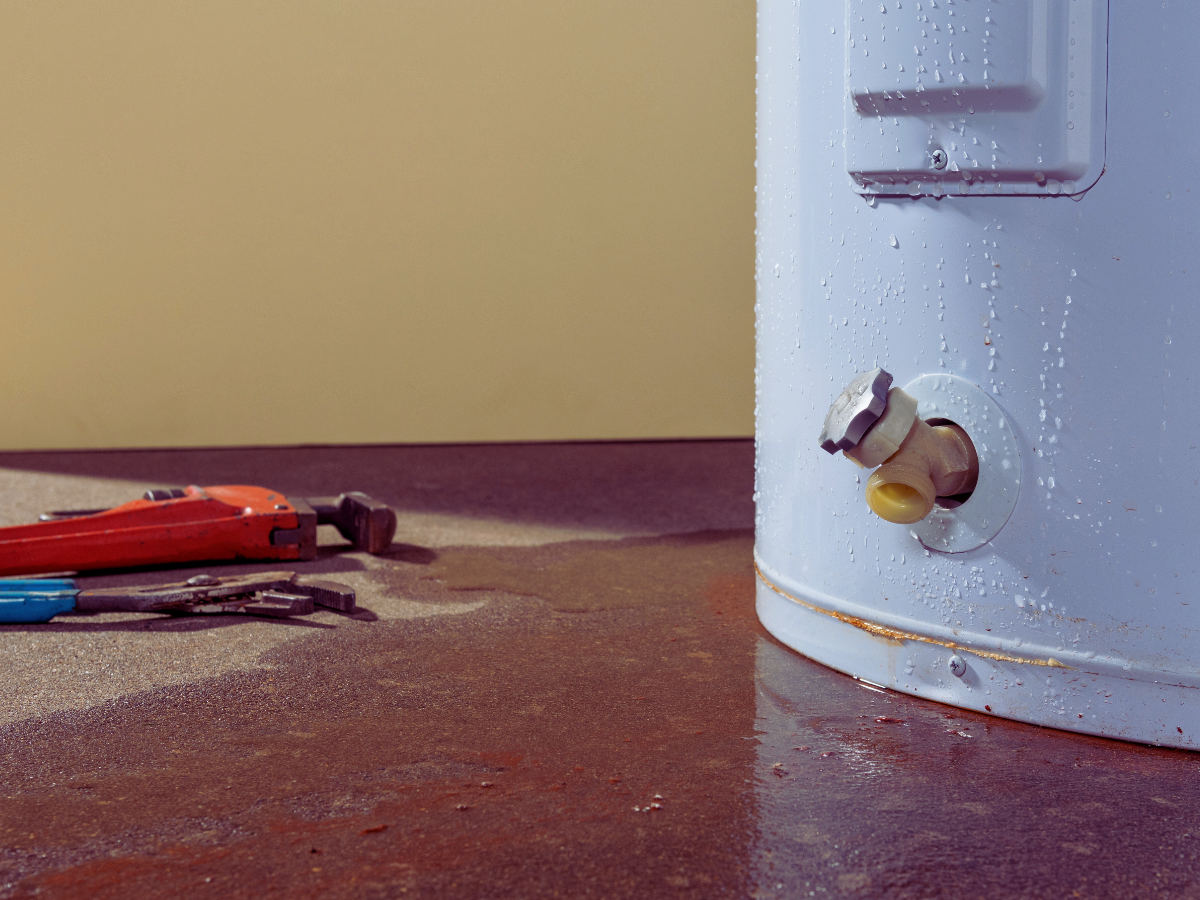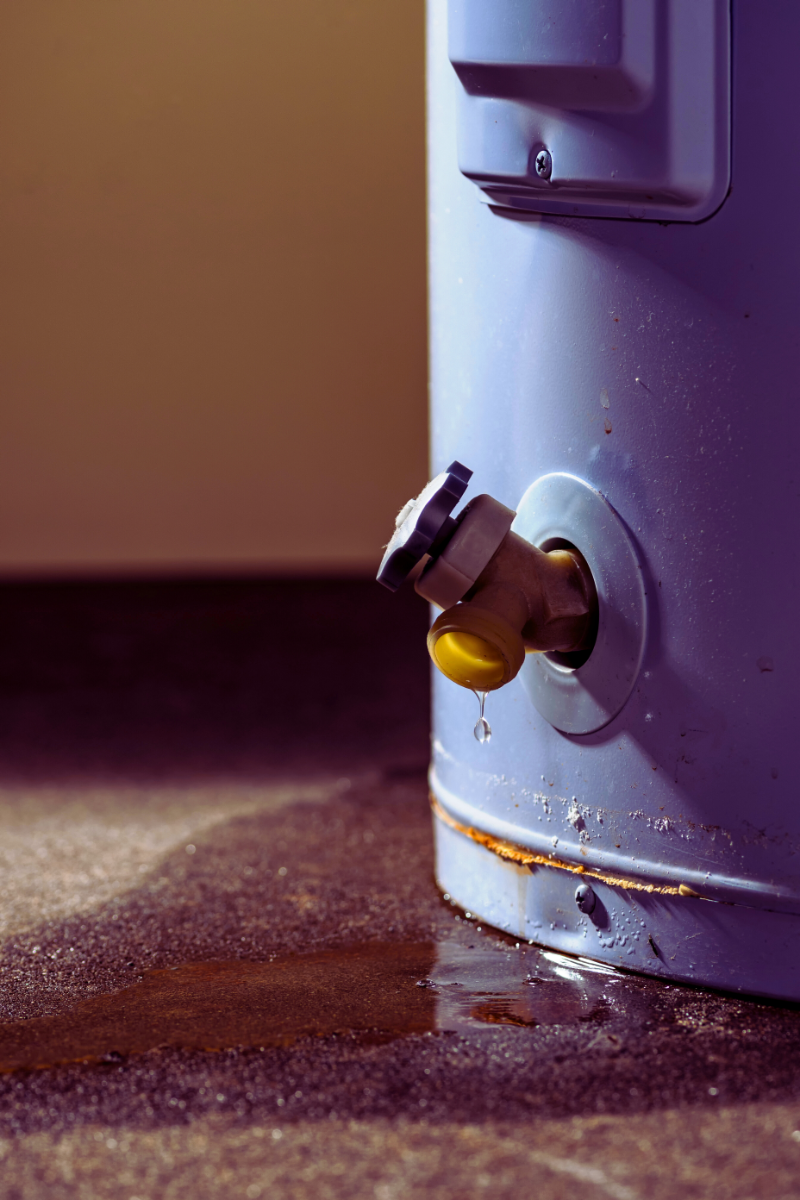Anytime your water heater leaks, you should pay close attention and act fast. Dangerous scenarios involving gas leaks or electrical hazards can quickly put your safety at risk if you don’t get quick help.
Quick Answer: Is a Leaking Water Heater Dangerous?
Absolutely — a leaking water heater poses serious risks, including:
- Pressure buildup that can lead to explosions
- Fire or electrical hazards from water contact
- Structural damage and mold from prolonged leaks
TL;DR: Shut it off and call a pro immediately.
How to Tell If Your Water Heater Is Leaking
 Changes in your hot water supply are a clear sign something may be wrong with the water heater. Catching a leak early is the best way to avoid expensive repairs.
Changes in your hot water supply are a clear sign something may be wrong with the water heater. Catching a leak early is the best way to avoid expensive repairs.
7 Clear Signs of a Leak
- Puddles forming beneath the tank
- Brown or discolored water coming from taps
- Odd popping, banging, or hissing noises
- Moldy, mildewy, or musty odors
- Weak or inconsistent hot water flow
- Rust flakes or heavy scale on the tank or lines
- Dampness around connections or the drain pan
Where Is the Leak Coming From?
Pinpointing the exact location of the leak is paramount to choosing the right repair method. Top-of-the-tank leaks usually require tightening fittings or replacing valves, while bottom-of-the-tank leaks need draining the tank or replacing it entirely. Below are the top warning signs to watch for to know where the problem is coming from.
Top of Tank Leaks
- Loose or damaged hot and cold water line connections
- Malfunctioning temperature and pressure relief valve
- Cracked or leaking expansion tank
Bottom of Tank Leaks
- Rupture or failure inside the tank
- Cracks from excess sediment collecting at the bottom
- Worn-out or poorly sealed drain valve
Is It Safe to Use a Leaking Water Heater?
In brief: No, and here’s the reasons:
- Gas units: A leak near the pilot or burner can ignite, creating a fire or explosion hazard.
- Electric units: Water exposure can cause short circuits and dangerous electric shock.
- All units: Leaks can lead to flooding, mold growth and unseen structural damage.
What Causes a Water Heater to Leak?
 There are several potential causes of water heater leaks, ranging from natural wear to preventable maintenance issues. Having a good understanding of the possible sources will help you know how to take action when you spot early warning signs.
There are several potential causes of water heater leaks, ranging from natural wear to preventable maintenance issues. Having a good understanding of the possible sources will help you know how to take action when you spot early warning signs.
Common Causes
- Natural aging and internal tank corrosion
- Deteriorated anode rod that no longer protects the tank
- Excessive water pressure or thermal expansion stress
- Cracked tank caused by long-term sediment buildup
- Improper installation or neglected maintenance
What to Do Immediately If Your Water Heater Is Leaking
Acting fast is the most important thing you can do for water heater leaks. Any delays to shut off the water or disconnect the power may increase water damage and electrical hazards.
Step-by-Step Emergency Checklist
- Cut power to the heater — Electric: switch off the breaker; Gas: turn control to OFF
- Shut the cold-water valve
- Drain the tank if safe
- Document damage for insurance
- Call a licensed plumber now
How to Prevent Future Water Heater Leaks
Keeping your water heater in good condition and safe from leaking doesn’t require major effort. A few simple steps will go a long way in preventing water damage and unsafe situations.
9 Pro Tips
- Drain and clean the tank once a year
- Check the T&P valve twice a year
- Swap out the anode rod every 3–5 years
- Add an expansion tank to handle pressure changes
- Install a pressure control valve if needed
- Wrap the tank in insulation in colder areas
- Tighten connections to prevent movement during quakes
- Leave complex plumbing work to a professional
- Book an annual inspection with a licensed plumber
When to Repair vs Replace Your Water Heater
Knowing when to repair or replace your water heater is something a professional plumber will be able to determine. We’ll consider its age, condition, and the source of the leak to guide you on making the best choice.
Choose Repair If:
- Leak comes from a valve or connection
- Unit is less than 8 years old
- No significant rust or corrosion in the tank
Replace If:
- Water seeps from the tank base
- System is over 10 years old
- Rust particles appear in hot water
- Pressure relief valve leaks keep recurring
Frequently Asked Questions (FAQ)
Got water heater leak questions? We’re here to help.
Can I take a shower with a leaking water heater?
You shouldn’t shower if the water heater leaks. It’ll make the leak much worse, and you risk water damage or electrical shock if the leak were to spread.
How long will a leaking water heater last?
A leaky water heater usually stops working in just weeks.
Will homeowners insurance cover the damage?
Whether or not your insurance covers water heater leaks all depends on the terms and conditions of your policy. Speaking with your provider can clarify what is and isn’t included.
What should I do if the water heater is leaking gas?
Shut off the home’s gas supply and exit immediately. Call your utility provider and a plumber for expert guidance.
Do all water heater leaks require replacement?
No, many leaks are fixable with timely repairs, part replacements, or proper maintenance.
Don’t Ignore a Water Heater Leak
 Putting off a leak repair will only make things worse and end up costing you more money. Plus, you put your family’s safety and health at risk when water damage leads to mold growth or electrical hazards. Acting quickly is at the heart of preventing further damage so you don’t have to worry about costly repairs later.
Putting off a leak repair will only make things worse and end up costing you more money. Plus, you put your family’s safety and health at risk when water damage leads to mold growth or electrical hazards. Acting quickly is at the heart of preventing further damage so you don’t have to worry about costly repairs later.
Our punctual plumbers arrive on time, diagnose the issue fast, and deliver lasting solutions. Call Benjamin Franklin’s water heater repair team today for expert service in Bradenton, FL and nearby areas.